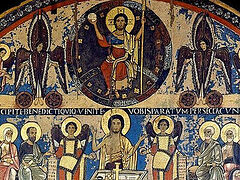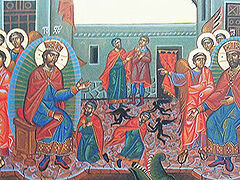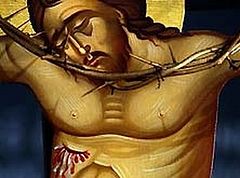In the name of the Father, and of the Son, and of the Holy Spirit!
Dear brothers and sisters in the Lord! Today, for our teaching and confirmation in the truths of Christian life, an extremely important and edifying gospel parable is offered to us, which each of us should try to imprint more deeply in his heart. The Gospel parable that we have now heard portrays on the one hand the immeasurable mercy of the Lord and God, according to which, for one sigh of heartfelt repentance, for one word of prayer, He forgives us all debts, all insults against His Divine Truth whether by thought, deed, or intention. And on the other hand the parable portrays the extreme cruelty of a man, by which he ignores the tears and requests of his fellow man, and is ready to subject him to reproach for an unpaid debt and destroy his well-being forever.
Therefore, the kingdom of heaven, says the Lord, is like a certain king who wanted to settle accounts with his servants. And when he had begun to settle accounts, one was brought to him who owed him ten thousand talents. But as he was not able to pay, his master commanded that he be sold, with his wife and children and all that he had, and that payment be made. The servant therefore fell down before him, saying, “Master, have patience with me, and I will pay you all.” Then the master of that servant was moved with compassion, released him, and forgave him the debt. “But that servant went out and found one of his fellow servants who owed him a hundred denarii; and he laid hands on him and took him by the throat, saying, “Pay me what you owe!” So, his fellow servant fell down at his feet and begged him, saying, “Have patience with me, and I will pay you all.” And he would not, but went and threw him into prison till he should pay the debt. So, when his fellow servants saw what had been done, they were very grieved, and came and told their master all that had been done. Then his master, after he had called him, said to him, “You wicked servant! I forgave you all that debt because you begged me. Should you not also have had compassion on your fellow servant, just as I had pity on you?” And his master was angry and delivered him to the torturers until he should pay all that was due to him. “So, My heavenly Father also will do to you if each of you, from his heart, does not forgive his brother his trespasses” (Мt. 18:23–35).
Do you see, dear brothers and sisters, what this parable teaches us? It teaches that the Lord is merciless to us if we ourselves are merciless; that He does not forgive our trespasses either, if we ourselves do not forgive our neighbors their trespasses against us. For if you forgive people their trespasses, our Savior admonishes us in another word, your Heavenly Father will also forgive you, but if you do not forgive people their trespasses, then your Father will not forgive you your trespasses (Matt. 6:14–15).
How then brethren can we not be merciful to our neighbors and not forgive their sins against us, when our Heavenly Father Himself loves us all? He is kind to both the ungrateful and the wicked. He commands the sun to shine on the evil and the good and sends rain on the righteous and the unrighteous (cf. Lk. 6:35; Matt. 5:45). Clearly, we must also love those whom the Lord Himself loves, and we must be as merciful as our Heavenly Father is merciful. It is precisely this kind of love—that is, love for the good and the evil—and this kind of mercy, out of His great love for humanity, that the Savior demands from us. Love your enemies, He says, bless those who curse you, do good to those who hate you, and pray for those who offend you and persecute you (Matt. 5:44). And whichever Christian does not have or show this love and mercy to all, including to his enemies, has, according to the Savior's teaching, no right to consider himself a true Christian—a member of the Christian Kingdom of Love and Peace.
Demanding love of humanity from us, our Lord Jesus Christ accounts both our acts of mercy and the cruelty we have done to our neighbors to Himself: Inasmuch, He says, as ye have done it unto one of the least of these my brethren, ye have done it unto me. Inasmuch as ye did it not to one of the least of these, ye did it not to me. (cf. Matt. 25:40, 45). That’s how humane and merciful the Lord our God is! He loves us all to such an extent that He is not ashamed to call us His brothers and, as you can see, He imputs our very love for our neighbor to His own person.
But we sinners are very often not moved by the Lord’s love and mercy for us, just as the debtor mentioned in the gospel parable was not moved by the king’s mercy. This is why the Lord urges us by the severity of His justice to be merciful. In His humanity and mercy, the Lord is ready to forgive us our great sins only when we ourselves forgive the sins of our neighbors. We see from the parable and from our own experiences and observations that even good and just people get upset, indignant and resentful against those who are cruel and unmerciful to their neighbors. Will not God, Who is so humane, so full of mercy, and at the same time all-righteous, turn His face away from us and change His mercy to righteous anger at the sight of our hardness of heart?
If we are hard-hearted toward our neighbors, not forgiving their sins against us, we cannot even approach the Lord and beg Him for forgiveness of our own sins. Indeed, how would we say, Our heavenly Father, forgive us our debts, as we also forgive our debtors (cf. Mt. 6:9, 12), when in reality we do not forgive our neighbor his sins against us? For then we would have lied before the Lord, and therefore, would only have angered Him and turned our prayer into sin. Being at enmity with our neighbors, according to the Savior's teaching, we have no right to bring our gifts to the temple of the Lord (see: Mt. 5:23-24). Our very tears and sighs, as St. Tikhon of Zadonsk says, will not benefit us if we do not let go of the sins of our neighbors. The just Lord will say with dignity and righteousness to every hard-hearted person, as the angry king said in the parable to his hard-hearted debtor: Wicked servant! Shouldn't you also have had mercy on your companion, as I have had mercy on you? So he will say to him and give him over o the hard-hearted torturers—that is, he will deliver him to a worthy punishment, for judgment is without mercy to him who has not shown mercy (Jas 2:13).
Which of us, brethren, is completely free from hard-heartedness towards our neighbors? Look, some of us offend and insult people around them, and others are offended and insulted themselves. But if both those who are offended and those who offend bear a hidden grudge against their neighbor in their hearts, then let them know and remember that such hard-heartedness will inevitably lead them to eternal perdition. And knowing this, let them not be slow to drive out malice and hatred towards their brothers from their hearts, let them hasten to reconcile with them and make amends for their deeds of cruelty with deeds of love and mercy. This is difficult, but not impossible with the help of God. It is difficult, but it is absolutely necessary for our salvation.
In order to fight more successfully against our pride, which prevents us from forgiving offenses and insults, we should often look to the example of our Savior, Who, when he was reviled, reviled not again; when he suffered, he threatened not (1 Pet. 2:23), but offered prayers to the Heavenly Father for His enemies and crucifiers. This is what the holy apostles, and what the holy First Martyr Archdeacon Stephen did.
Why do you hate the person who insulted you, says Venerable Mother Synclitica. It was not he who insulted you, but the devil; have hatred for the disease, not for the sick.
To conclude our conversation, let us apply to ourselves the words of the Holy Apostle Paul: Do not be overcome by evil, but overcome evil with good. Be at peace with all men. Let not the sun go down upon your wrath (cf. Rom. 12:21,18; Eph. 4:26). Forgive, and you will be forgiven, and you will become heirs of the Kingdom of God! Amen.




